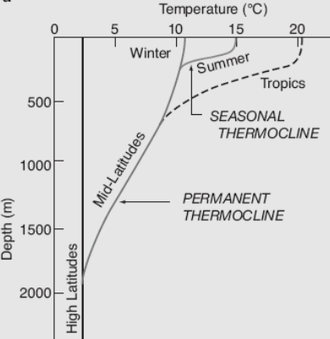Ocean heat content
[[File:Oceans_of_Climate_Change.ogv_|Oceans of Climate Change.ogv
Ocean Heat Content (OHC) refers to the heat stored in the ocean. The concept is crucial in understanding climate change and oceanography, as the ocean acts as a heat sink, absorbing and storing heat from the atmosphere. This process plays a significant role in regulating the Earth's climate system.
Overview
The ocean covers approximately 71% of the Earth's surface and can absorb more heat than the atmosphere due to water's high specific heat capacity. The majority of the excess heat trapped by greenhouse gases in the Earth's atmosphere is stored in the oceans, making OHC a vital metric for gauging the rate of global warming. Changes in OHC are associated with various climate patterns, such as El Niño and La Niña, which have significant impacts on weather across the globe.
Measurement
OHC is measured in joules and is typically assessed through a variety of methods, including satellites, buoys, and Argo floats. Argo floats, in particular, have revolutionized the way scientists measure OHC by providing accurate and consistent data from the ocean's surface down to 2000 meters. These instruments measure the temperature, salinity, and depth of the ocean, allowing scientists to calculate the amount of heat stored in various layers.
Importance
Understanding OHC is critical for several reasons:
- Climate Modeling: Accurate OHC measurements help improve climate models, which are essential for predicting future climate conditions.
- Sea Level Rise: As water heats up, it expands. This thermal expansion contributes to sea level rise, which poses a threat to coastal communities around the world.
- Marine Ecosystems: Changes in OHC can affect marine ecosystems and biodiversity. For example, warmer ocean temperatures can lead to coral bleaching and affect fish migration patterns.
Challenges
Despite its importance, measuring OHC poses several challenges. The vastness and depth of the oceans make comprehensive coverage difficult. Additionally, the accuracy of historical data is often lower than that of modern measurements, complicating efforts to understand long-term trends.
Recent Trends
Recent studies have shown that OHC has been increasing, particularly since the mid-20th century. This trend is consistent with observations of global warming and is a clear indicator of the ongoing impact of human activities on the Earth's climate system.
Conclusion
Ocean Heat Content is a critical component of the Earth's climate system. Its study helps scientists understand more about the complexities of climate change and the role of the oceans in absorbing atmospheric heat. As research methods continue to improve, our understanding of OHC and its implications for the planet will become even clearer.
Transform your life with W8MD's budget GLP-1 injections from $125.
W8MD offers a medical weight loss program to lose weight in Philadelphia. Our physician-supervised medical weight loss provides:
- Most insurances accepted or discounted self-pay rates. We will obtain insurance prior authorizations if needed.
- Generic GLP1 weight loss injections from $125 for the starting dose.
- Also offer prescription weight loss medications including Phentermine, Qsymia, Diethylpropion, Contrave etc.
NYC weight loss doctor appointments
Start your NYC weight loss journey today at our NYC medical weight loss and Philadelphia medical weight loss clinics.
- Call 718-946-5500 to lose weight in NYC or for medical weight loss in Philadelphia 215-676-2334.
- Tags:NYC medical weight loss, Philadelphia lose weight Zepbound NYC, Budget GLP1 weight loss injections, Wegovy Philadelphia, Wegovy NYC, Philadelphia medical weight loss, Brookly weight loss and Wegovy NYC
|
WikiMD's Wellness Encyclopedia |
| Let Food Be Thy Medicine Medicine Thy Food - Hippocrates |
Medical Disclaimer: WikiMD is not a substitute for professional medical advice. The information on WikiMD is provided as an information resource only, may be incorrect, outdated or misleading, and is not to be used or relied on for any diagnostic or treatment purposes. Please consult your health care provider before making any healthcare decisions or for guidance about a specific medical condition. WikiMD expressly disclaims responsibility, and shall have no liability, for any damages, loss, injury, or liability whatsoever suffered as a result of your reliance on the information contained in this site. By visiting this site you agree to the foregoing terms and conditions, which may from time to time be changed or supplemented by WikiMD. If you do not agree to the foregoing terms and conditions, you should not enter or use this site. See full disclaimer.
Credits:Most images are courtesy of Wikimedia commons, and templates, categories Wikipedia, licensed under CC BY SA or similar.
Contributors: Prab R. Tumpati, MD





